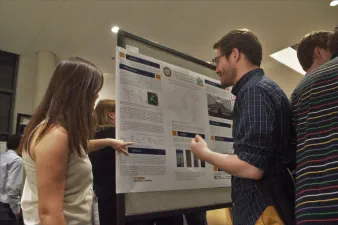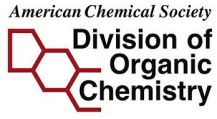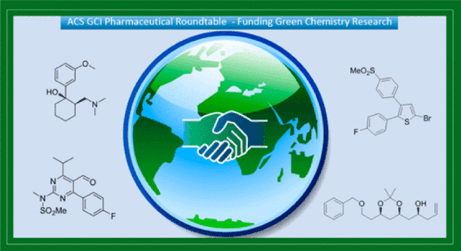Green Chemistry
Green Chemistry provides a framework for designing more sustainable chemicals and chemical processes by eliminating waste and carbon emissions, conserving energy and natural resources, and minimizing the use and generation of hazardous substances. There is growing recognition within chemical industries, especially the pharmaceutical industry (here is a curated list of relevant papers), that embracing green chemistry is essential to meet future demand for chemical products while minimizing environmental and social impacts. This is a field that is poised for revolutionary progress, and organic chemists will play a key role in creating a more sustainable future. See: Tweets by ACS GCE
The following external resources and links are intended to foster Green Chemistry in the organic chemistry community. The external organizations provided herein are not endorsed by the DOC. Please Contact Us/Provide Feedback to improve the website or resources.
Green Chemistry Network:
The ACS Green Chemistry & Engineering Conference (GCE or GCANDE)) is the longest-running global conference dedicated to green chemistry and engineering. The annual conference is held in mid-June on the US West Coast (even-numbered years) or the East Coast (odd-numbered years). The GC&E family has grown considerably over the past 24 conferences and has representation from the international Green Chemistry community.
The ACS Green Chemistry Institute (GCI) Pharmaceutical Roundtable (GCIPR) is composed of member companies dedicated to catalyzing the integration of green chemistry and engineering in the pharmaceutical industry. Established in 2005 by the American Chemical Society’s Green Chemistry Institute, the Roundtable’s activities are driven by the shared belief that green chemistry and engineering is imperative for business and environmental sustainability. By exploring the links below, you can learn how to bring more sustainable approaches into the development and application of organic chemistry.
The GCIPR has assembled a list of key green chemistry research areas to both identify transformations that would benefit from improvements in process greenness and to encourage academic research to this end. Innovation and advancements in these areas have the potential to significantly improve the sustainability of pharmaceutical development and manufacturing.
Key Research Areas:
- Development of effective and versatile methodology utilizing cheap/sustainable metals.
- General methods for catalytic/sustainable (direct) amide or peptide formation.
- Aliphatic and aromatic C–H activation, using green oxidants and giving predictable site selectivities.
- Amide reductions avoiding LiAlH4 and diborane.
- Direct substitution of alcohols.
- Catalyst immobilization without significant loss in kinetics.
- Asymmetric hydrogenation of unfunctionalized olefins/ enamines/imines.
- Improved fluorination/trifluoromethoxylation.
- Wittig chemistry without Ph3PO.
- Alternatives for oxidations, C–O or C–N redox processes.
- Viable replacements for polar aprotic solvents.
- Viable replacements for halogenated solvents.
References:
- Key Green Chemistry research areas from a pharmaceutical manufacturers’ perspective revisited. Marian C. Bryan, Peter J. Dunn, David Entwistle, Fabrice Gallou, Stefan G. Koenig, John D. Hayler, Matthew R. Hickey, Shaun Hughes, Michael E. Kopach, Gerard Moine, Paul Richardson, Frank Roschangar, Alan Steven and Franz J. Weiberth. Green Chem., 2018, 20, 5082.
- Key Green Engineering Research Areas for Sustainable Manufacturing: A Perspective from Pharmaceutical and Fine Chemicals Manufacturers. Concepción Jiménez-González, Peter Poechlauer, Quirinus B. Broxterman, Bing-Shiou Yang, David am Ende, James Baird, Carl Bertsch, Robert E. Hannah, Phil Dell’Orco, Henk Noorman, Sandy Yee, Raf Reintjens, Andrew Wells, Viviane Massonneau, and Julie Manley. Org. Process Res. Dev. 2011, 15, 4, 900–911
Grants and Advancing research:
The ACS GCI Pharmaceutical Roundtable has identified key synthetic chemistry and process research challenges whose solutions would result in more efficient pharmaceutical process development and production. To spur research in these areas, the Roundtable created and maintains a research grant program, whose impact over the years has been recently documented. The Roundtable also advocates for targeted green chemistry and engineering support to academic and government labs from international and U.S. federal funding agencies (see the GCIPR Advancing research page for more information).
Over $3 million dollars (US) have been funded by the ACS GCI Pharmaceutical Roundtable (GCIPR) since their grant program began in 2007. Each Spring, new Request for Proposals (RFPs) are issued for different key research challenges faced by the pharmaceutical industry.
References:
- Evaluating the Impact of a Decade of Funding from the Green Chemistry Institute Pharmaceutical Roundtable. Stefan G. Koenig, David K. Leahy, and Andrew S. Wells. Org. Process Res. Dev., 2018, 20, 22 (10), 1344-1359.
Find additional information of Green Chemistry resources at the designated GCIPR site of Organic Chemistry Data. Please Contact Us and provide feedback to improve the Green Chemistry resources that are offered by the DOC.





